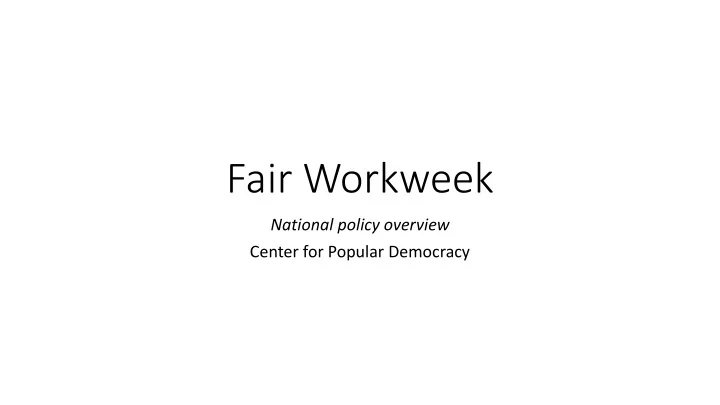

Fair Workweek National policy overview Center for Popular Democracy
Center for Popular Democracy and the Fair Workweek Initiative • CPD is a 501(c)(3) organization founded in 2012, with approximately 60 staff, offices in New York City and Washington, DC, and staff in Minnesota, Boston, Philadelphia, Los Angeles, Oakland and Chicago. • CPD promotes equity, opportunity and a dynamic democracy in partnership with more than 43 organizations in 30 states across the country. • The Fair Workweek Initiative, anchored by CPD, supports efforts to restore a workweek that enables working families to thrive. • We are nationally recognized for our policy and research expertise, as well as building capacity for partner organizations to elevate the voices of working people in shaping the solutions to our country’s most pressing economic and social challenges.
Persistent challenges in today’s workweek • Involuntary, low-quality part-time work • Excessive part-timing • Lower pay and lack of access to promotion for part-time workers • Lack of input and flexibility • Open availability requirements • Retaliation against workers who request scheduling accommodations • Unpredictable, unstable hours • Huge fluctuations in weekly work hours • Lack of notice of work schedules • Frequent changes in schedules • Disparate impact on women and workers of color • Erosion of career ladders
Involuntary part-time employment more than doubled between 2008-2010
National data on scheduling trends The majority of American workers – 3 in 5 – are paid hourly. Of all early career hourly workers (26-32 years old): • 50% have no input into their work schedules; • 41% receive their work schedule with a week or less notice; • 75% report at least some fluctuations in their weekly hours. Source: Susan J. Lambert, Peter J. Fugiel , Julia R. Henley, “Schedule Unpredictability among Early Career Adults in the U.S. Labor Market”, University of Chicago 2014. Bureau of Labor Statistics, U.S. Department of Labor (2012). Labor Force Statistics from the Current Population Survey, Characteristics of Minimum Wage Workers: 2012 . Washington: Bureau of Labor Statistics. Retrieved from www.bls.gov/cps/minwage2012.htm
Erratic work schedules despite hidden stability in business Individual worker schedules over a year at one retail store. The thick line shows the store staffing hours and the hidden stability. Source: Susan J. Lambert and Julia R. Henly “Work Scheduling Study: A Profile of Retail Sales Associates in a Women’s Apparel Firm,” The University of Chicago, September 2015 .
Development of model policy • CPD collaborated with leading national advocacy groups to develop policy ideas for a fair workweek, including the National Employment Law Project (NELP), A Better Balance (ABB), the National Women’s Law Center (NWLC), and the Center on Law and Social Policy (CLASP). • The policy concepts developed by this coalition were the starting place for the San Francisco Retail Workers Bill of Rights (RWBOR), enacted in 2014. • CPD refined the model policy to incorporate lessons learned through our involvement in the implementation and rulemaking process for RWBOR, engagement with technology vendors, large and small businesses, and hourly workers - again with input from NELP, ABB, NWLC and CLASP.
Research underlying the model ordinance • Professor Susan Lambert’s data from a national survey: significant proportions of early career hourly workers have unpredictable, unstable and inflexible work schedules. • CPD’s research: trends in low -wage, part-time work in fast-growing sectors like retail and food service disproportionately impact women. • Professors in retail operations: data shows that stable, predictable schedules and access to full-time work are profitable for businesses. • Research on impacts of unpredictable, unstable schedules on health, family relationships, and child development. • In-depth surveys of thousands of hourly workers.
Business engagement has shaped policy • Discussions with large and small businesses in several cities; policy deep dive with leading small business owners from across the country. • Stakeholder meetings on SF Retail Workers Bill of Rights implementation and rulemaking. • Gap, Inc. Stable Schedules study (results forthcoming Sept. 2016). • Feasibility analysis from leading scheduling technology firms.
Key elements of the model policy • Establish work hours standards for hourly workers at large retail and food service establishments, who are the most vulnerable to unstable, unpredictable scheduling practices. • Preserve the flexibility employers and employees need in making work schedules, while promoting stability for hourly workers. • Incentivize adequate notice of work schedules and compensating employees for being flexible for accommodating short-notice changes. • Promote adequate hours and full-time work for people who want it. • Advance healthy schedules with adequate rest. • Protect workers’ right to provide input into schedules.
National context • Existing law • San Francisco Retail Workers Bill of Rights • Vermont Right to Request law • Reporting pay exists in many states: MA, NH, RI, DC, CT, NY, CA, OR, NJ • Legislation under consideration using CPD’s model policy • Washington DC • Seattle, WA • Emeryville, CA • San Jose, CA • Minneapolis, MN • Several states including RI, CA, NJ, NH, MD, MA
Recommend
More recommend